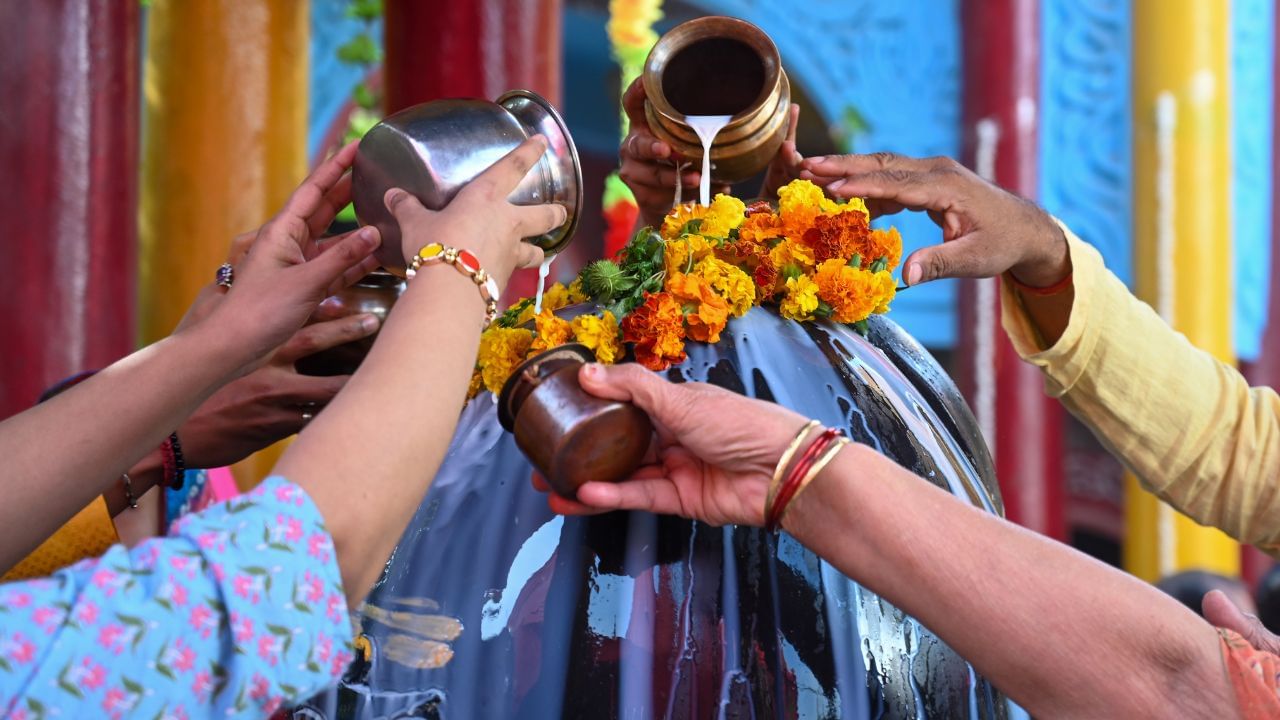What should not be offered by mistake on Shivling in Sawan? Image Credit Source: Sunil Ghosh/HT Via Getty Images
Sawan me shivling puja ke niyam: The month of Sawan is considered to be the most auspicious for worshiping Lord Shiva. During this time, lakhs of devotees keep fast, travel to Kavad and perform Jalabhishek and worship on Shivling. But there are some special rules of Shiva worship, which is very important to follow. If some wrong things are mounted on the Shivling even in the unknown, then its fruit may be reversed and may also be blamed. Let us know, what things should not be offered on the Shivling even after forgetting the spring.
According to belief, what things should not be offered on Shivling by mistake?
Turmeric
Turmeric is often used in auspicious works and it is dear to Lord Vishnu and other deities. But turmeric is not offered to Lord Shiva. According to religious beliefs, turmeric is related to beauty and good luck, while Lord Shiva is a symbol of disinterest and sacrifice. Turmeric is used by women to enhance their beauty, and Shivling is considered a symbol of male element. Therefore, offering turmeric on Shivling is considered inauspicious.
Sindoor or kumkum
Sindoor or Kumkum is a sign of Suhag and married women use it for their husband’s long life. It is also offered to the Gods and Goddesses, but Lord Shiva should not be offered vermilion or kumkum. Lord Shiva is the god of destruction and is also called destroyer. Sindoor is a symbol of good fortune and Shiva is often seen as a disinterest form. The use of this type of material in his worship is considered taboo.
Basil leaves
Tulsi plant is considered very sacred and Tulsi is very dear to Lord Vishnu. But offering basil leaf on Shivling is prohibited. There is a legend behind it. According to the legend, Vrinda, wife of an asura named Jalandhar, was a husband and no one could kill Jalandhar due to his purity. Lord Vishnu dissolved Vrinda’s husband’s religion, after which Vrinda became Tulsi. Since Jalandhar was slaughtered by Lord Shiva, Vrinda i.e. Tulsi cursed not to be used in worship of Shiva.
Ketki flower
Ketki’s flower is white and fragrant, but it is not offered on the Shivling. There is also a legend behind this. It is said that once there was a dispute between Brahma and Vishnu about the superiority. During this time a huge Jyotirlinga appeared and it was decided that whoever would find its beginning or end, he would be called the best. Brahma ji persuaded Ketki’s flower to lie that he had gone to find the etc. of Jyotirlinga with him. Due to this lie, Lord Shiva cursed Ketki’s flower to never be used in his worship.
Broken rice
Rice is called Akshat and it is considered auspicious. But always offer whole rice on Shivling. Offering broken or fragmented rice is considered inauspicious. Fragrant materials should not be used in worship as it is a symbol of imperfection.
Water from conch shell
In the worship of Lord Shiva, water should not be offered from the conch. According to mythology, Lord Shiva killed an asura named Shankhachud, who was a devotee of Lord Vishnu. The conch was formed from the bones of Shankhchud, so the use of conch is forbidden in the worship of Lord Shiva. The use of conch is considered auspicious in the worship of Lord Vishnu.
Broken belpat
Belpatra is very dear to Shiva, but it is considered defective to placing broken, worm or dry belpatra on Shivling. It is considered necessary in worship by cleaning the belpatra and its three leaves are fully connected.
Disclaimer: The information given in this news is based on religious beliefs. TV 9 India does not confirm this.
